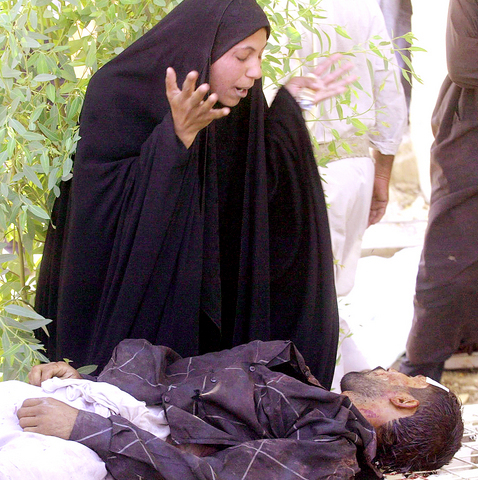A suicide bomber pulled his minibus into a busy market yesterday, lured laborers onboard with the promise of jobs and then blew himself up, killing at least 59 people in one the bloodiest attacks in Iraq this year.
The blast in the Shiite city of Kufa wounded 132 people and sparked clashes between police and angry protesters, dealing a fresh blow to Prime Minister Nuri al-Maliki's efforts to promote national reconciliation and avoid a slide toward civil war.
Maliki, a Shiite who has offered a dialogue with some Sunni insurgent groups since he took office in April, pledged to "hunt down and punish" those responsible.

PHOTO: AFP
Police at the scene were pelted with rocks by angry crowds, many of whom demanded that militias loyal to radical Shiite cleric Moqtada al-Sadr take over security in Kufa, near the holy city of Najaf, 160km south of Baghdad.
The blast occurred about 7:30am across the street from the gold-domed mosque in Kufa, police Captain Nafie Mohammed said.
It happened shortly after the minibus had pulled out of the market with a group of laborers.
"He came asking for workers. When they boarded the minibus the vehicle exploded," a witness said.
Protesters gathered around the blackened mangle of vehicles. Blood-stained clothes were scattered amid the debris.
"We want the Mehdi Army to protect us. We want Moqtada's army to protect us," a woman dressed in a black abaya screamed.
Others chanted to the police: "You are traitors! You are not doing your job! American agents!"
Police then fired automatic rifles into the air to disperse the crowds and confused scenes ensued. Some civilians, who appeared to be Sadr followers, were seen carrying weapons.
"It is very chaotic now. The police are shooting in the air and the crowds are running," a reporter at the scene said. "Ambulances are racing around town."
A man with a bandage on his head in a Kufa hospital said: "Where are our human rights?"
The blast was one of the bloodiest since Maliki's national unity government of Shiites, Sunnis and Kurds took office in April on pledges to rein in sectarian bloodshed.
Violence between majority Shiites and Sunnis, dominant under former Iraqi president Saddam Hussein, but now the backbone of an insurgency against the US-sponsored political process, has pushed Iraq close to civil war and complicated US plans to withdraw troops.
Earlier this month, a suicide truck bomb ripped through Baghdad's eastern Sadr city slum, killing at least 62 people. The area is a stronghold of Sadr, who sometimes preaches in Kufa and is a rising political figure in Maliki's government.
The attack came a day after gunmen killed more than 50 people in Mahmudiya, near Baghdad.
Najaf Governor Assad Abu-Kalal blamed the Kufa attack on the "criminal Baathists and terrorists of Mahmoudiya."

Indonesia yesterday began enforcing its newly ratified penal code, replacing a Dutch-era criminal law that had governed the country for more than 80 years and marking a major shift in its legal landscape. Since proclaiming independence in 1945, the Southeast Asian country had continued to operate under a colonial framework widely criticized as outdated and misaligned with Indonesia’s social values. Efforts to revise the code stalled for decades as lawmakers debated how to balance human rights, religious norms and local traditions in the world’s most populous Muslim-majority nation. The 345-page Indonesian Penal Code, known as the KUHP, was passed in 2022. It

‘DISRESPECTFUL’: Katie Miller, the wife of Trump’s most influential adviser, drew ire by posting an image of Greenland in the colors of the US flag, captioning it ‘SOON’ US President Donald Trump on Sunday doubled down on his claim that Greenland should become part of the US, despite calls by the Danish prime minister to stop “threatening” the territory. Washington’s military intervention in Venezuela has reignited fears for Greenland, which Trump has repeatedly said he wants to annex, given its strategic location in the arctic. While aboard Air Force One en route to Washington, Trump reiterated the goal. “We need Greenland from the standpoint of national security, and Denmark is not going to be able to do it,” he said in response to a reporter’s question. “We’ll worry about Greenland in

PERILOUS JOURNEY: Over just a matter of days last month, about 1,600 Afghans who were at risk of perishing due to the cold weather were rescued in the mountains Habibullah set off from his home in western Afghanistan determined to find work in Iran, only for the 15-year-old to freeze to death while walking across the mountainous frontier. “He was forced to go, to bring food for the family,” his mother, Mah Jan, said at her mud home in Ghunjan village. “We have no food to eat, we have no clothes to wear. The house in which I live has no electricity, no water. I have no proper window, nothing to burn for heating,” she added, clutching a photograph of her son. Habibullah was one of at least 18 migrants who died

Russia early yesterday bombarded Ukraine, killing two people in the Kyiv region, authorities said on the eve of a diplomatic summit in France. A nationwide siren was issued just after midnight, while Ukraine’s military said air defenses were operating in several places. In the capital, a private medical facility caught fire as a result of the Russian strikes, killing one person and wounding three others, the State Emergency Service of Kyiv said. It released images of rescuers removing people on stretchers from a gutted building. Another pre-dawn attack on the neighboring city of Fastiv killed one man in his 70s, Kyiv Governor Mykola